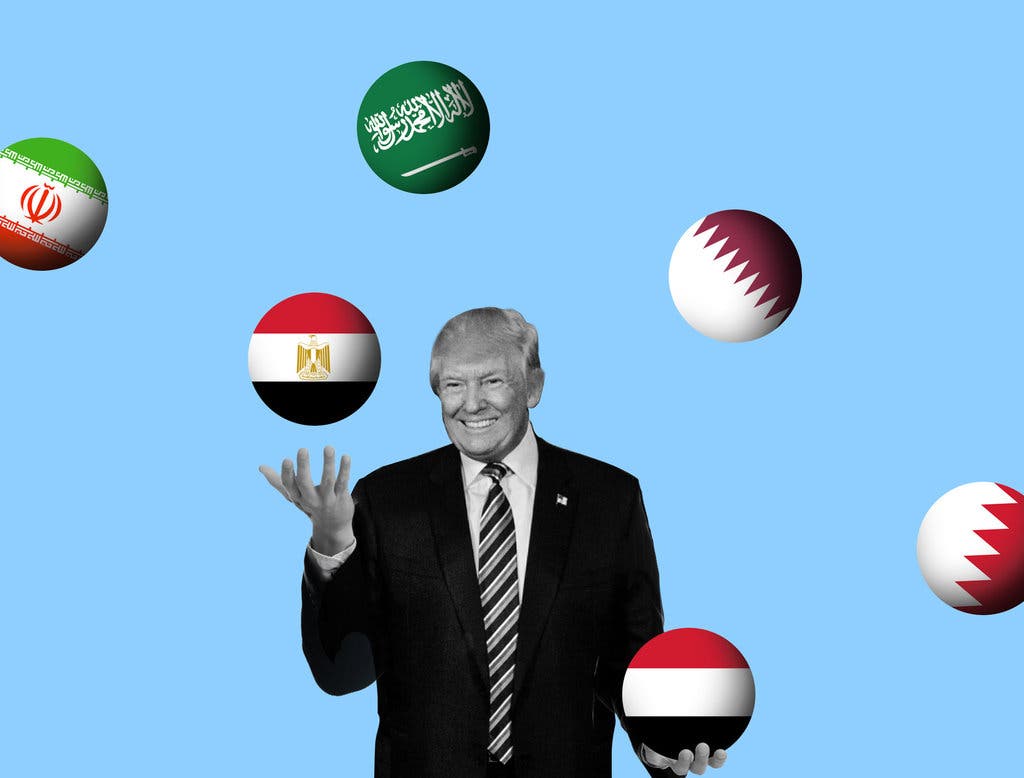Trump's Foreign Policy And His Relationships With Arab Leaders

Table of Contents
The Iran Nuclear Deal and its Impact on Relations with Arab Allies
Trump's withdrawal from the Joint Comprehensive Plan of Action (JCPOA), the Iran nuclear deal, in 2018 dramatically reshaped his administration's relationship with key Arab allies. This decision, driven by a desire to counter Iran's regional influence, had profound geopolitical consequences. The withdrawal was lauded by Saudi Arabia and the UAE, who viewed Iran as a major threat. However, it also fueled concerns amongst some Arab states about potential unintended consequences and increased regional instability.
- Increased military cooperation with Saudi Arabia and the UAE: Following the withdrawal, the Trump administration significantly increased arms sales and military cooperation with these nations, strengthening their capabilities to counter perceived Iranian aggression. This included increased intelligence sharing and joint military exercises.
- Concerns among some Arab states about Iran's regional influence: While some Arab nations welcomed the tougher stance against Iran, others worried about escalating tensions and the potential for wider conflicts. The withdrawal complicated existing regional dynamics and power balances.
- Economic implications of the withdrawal for Arab nations: The withdrawal affected trade and investment flows in the region. While some nations benefited from increased military contracts, others faced economic challenges due to the sanctions re-imposed on Iran.
- Increased regional tensions and potential for conflict: Trump's decision undeniably heightened regional tensions, increasing the risk of military confrontations and further destabilizing an already fragile geopolitical environment. The increased military presence and arms sales contributed to this heightened risk. Keywords: Iran nuclear deal, JCPOA, Saudi Arabia, UAE, regional security, Middle East tensions.
Trump's Approach to the Israeli-Palestinian Conflict
Trump's foreign policy towards the Israeli-Palestinian conflict was characterized by a strong pro-Israel stance, culminating in the unveiling of the "Deal of the Century" peace plan. This plan, which heavily favored Israel, received mixed reactions from Arab leaders. Some cautiously welcomed the attempt at a negotiated settlement, while others strongly condemned it as biased and unrealistic.
- Shifting alliances and changing dynamics in the region: The "Deal of the Century" further complicated the already complex web of alliances and rivalries in the Middle East. Some Arab nations adjusted their stances based on their individual relationships with both Israel and Palestine.
- Reactions from Palestinian leaders and their implications: Palestinian leaders firmly rejected the plan, highlighting its failure to address core Palestinian concerns, such as the right of return and the status of Jerusalem. This rejection further strained US-Palestinian relations.
- The role of key Arab states in mediating the conflict (or lack thereof): Key Arab states played a limited role in mediating the conflict during the Trump administration, highlighting the divisions within the Arab world on this issue and the dominance of bilateral relationships with the US.
- Long-term consequences of Trump’s approach for regional stability: Trump's approach to the Israeli-Palestinian conflict had far-reaching consequences, potentially hindering future peace efforts and fueling further instability in the region. The lack of a comprehensive and widely accepted solution further entrenched existing divisions. Keywords: Israeli-Palestinian conflict, peace process, Deal of the Century, Palestine, Israel, Arab League.
Economic and Trade Relations with Arab Nations
The Trump administration pursued a transactional approach to economic and trade relations with Arab nations, prioritizing bilateral deals focused on specific economic interests. This approach led to a mix of increased cooperation in some areas and strained relationships in others.
- Arms sales and military contracts with various Arab nations: The administration significantly increased arms sales to several Arab countries, solidifying existing military alliances and boosting the US defense industry. However, this fueled concerns about regional arms races and the potential for further conflict.
- Focus on energy security and trade relationships: The Trump administration emphasized energy security and bilateral trade deals, seeking to strengthen economic ties with Arab oil-producing nations. This focused approach prioritized short-term economic gains over broader strategic objectives.
- Economic sanctions and their effects on Arab economies: The imposition of economic sanctions, particularly against Iran, had significant effects on Arab economies, impacting trade and investment flows within the region.
- Investment and business opportunities fostered (or hindered) by Trump's policies: Trump's policies had a varied impact on investment and business opportunities in the Arab world. While some sectors benefited from increased trade and investment, others faced challenges due to uncertainty and sanctions. Keywords: US trade, Arab economies, energy security, arms sales, economic sanctions, foreign investment.
Counter-Terrorism Strategies and Cooperation with Arab Partners
Trump's counter-terrorism strategy in the Middle East relied heavily on military action and cooperation with regional partners. While the administration achieved some successes against ISIS, its approach also faced criticisms regarding human rights and the unintended consequences of its actions.
- Military actions against ISIS and other terrorist groups: The Trump administration intensified military action against ISIS in Iraq and Syria, resulting in territorial gains and the eventual defeat of the group's self-proclaimed caliphate.
- Intelligence sharing and cooperation with Arab nations: The administration strengthened intelligence sharing and cooperation with Arab partners to counter terrorist threats. This included joint military operations and the sharing of sensitive intelligence information.
- The role of military bases and partnerships in counter-terrorism efforts: US military bases and partnerships in the region played a significant role in counter-terrorism efforts, allowing for rapid response and sustained operations.
- Human rights concerns and criticisms related to counter-terrorism actions: The administration's counter-terrorism strategy faced criticism regarding human rights abuses, collateral damage, and the potential for unintended consequences, including the radicalization of new recruits. Keywords: Counter-terrorism, ISIS, Al-Qaeda, regional security, military cooperation, human rights.
Assessing the Legacy of Trump's Approach to the Arab World
Trump's foreign policy towards the Arab world was characterized by a transactional approach, prioritizing short-term gains and bilateral relationships. His decisions, particularly regarding the Iran nuclear deal and the Israeli-Palestinian conflict, significantly altered the regional geopolitical landscape. The long-term consequences of his policies remain to be fully seen, but they have undoubtedly left a lasting impact on US relations with the Arab world and the broader Middle East. The increased military cooperation, economic realignments, and shifts in regional alliances will continue to shape the region for years to come. His legacy will be debated for years to come, with ongoing implications for future US foreign policy in the region.
To further your understanding of Trump's foreign policy and its impact on the Arab world, we encourage you to explore additional resources and engage in informed discussions about this complex and crucial subject. [Link to relevant resources here].

Featured Posts
-
 Stem Scholarships For Local Students Eligibility Application Process And Deadlines
May 17, 2025
Stem Scholarships For Local Students Eligibility Application Process And Deadlines
May 17, 2025 -
 Exclusive Hhs To Reconsider Covid Vaccine Recommendations Following Rfk Jr S Intervention
May 17, 2025
Exclusive Hhs To Reconsider Covid Vaccine Recommendations Following Rfk Jr S Intervention
May 17, 2025 -
 High Stock Market Valuations A Bof A Analysis And Reasons For Investor Calm
May 17, 2025
High Stock Market Valuations A Bof A Analysis And Reasons For Investor Calm
May 17, 2025 -
 Yankees Vs Mariners Prediction Picks And Odds For Todays Mlb Game
May 17, 2025
Yankees Vs Mariners Prediction Picks And Odds For Todays Mlb Game
May 17, 2025 -
 What Is Creatine Your Guide To This Popular Supplement
May 17, 2025
What Is Creatine Your Guide To This Popular Supplement
May 17, 2025
Latest Posts
-
 El Desempeno De David Del Valle Uribe Representando A Reynosa En La Olimpiada Nacional
May 17, 2025
El Desempeno De David Del Valle Uribe Representando A Reynosa En La Olimpiada Nacional
May 17, 2025 -
 Reynosa En La Olimpiada Nacional La Participacion De David Del Valle Uribe
May 17, 2025
Reynosa En La Olimpiada Nacional La Participacion De David Del Valle Uribe
May 17, 2025 -
 David Del Valle Uribe El Representante De Reynosa En La Olimpiada Nacional
May 17, 2025
David Del Valle Uribe El Representante De Reynosa En La Olimpiada Nacional
May 17, 2025 -
 David Del Valle Uribe Representando A Reynosa En La Olimpiada Nacional
May 17, 2025
David Del Valle Uribe Representando A Reynosa En La Olimpiada Nacional
May 17, 2025 -
 Veteran Springfield Councilman Appointed To Missouri Education Board
May 17, 2025
Veteran Springfield Councilman Appointed To Missouri Education Board
May 17, 2025
